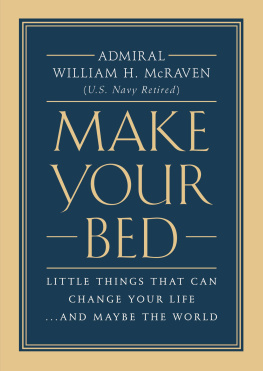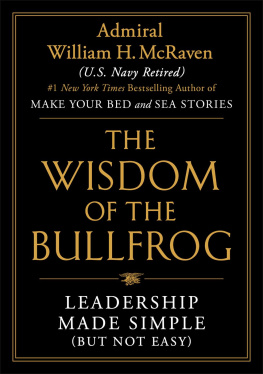To my three children: Bill, John, and Kelly. No father could be prouder of his kids than I am of you. Every moment in my life has been made better because you are in the world.
And to my wife, Georgeann, my best friend, who made all of my dreams possible. Where would I be without you?

On May 17, 2014, I was honored to give the commencement speech for the graduating class from the University of Texas at Austin. Even though the university was my alma mater, I was concerned that a military officer, whose career had been defined by war, might not find a welcoming audience among college students. But to my great surprise, the graduating class embraced the speech. The ten lessons I learned from Navy SEAL training, which were the basis for my remarks, seemed to have a universal appeal. They were simple lessons that deal with overcoming the trials of SEAL training, but the ten lessons were equally important in dealing with the challenges of lifeno matter who you are. Over the past three years, I have been stopped on the street by great folks telling me their own stories: How they didnt back down from the sharks, how they didnt ring the bell, or how making their bed every morning helped them through tough times. They all wanted to know more about how the ten lessons shaped my life and about the people who inspired me during my career. This small book is an attempt to do so. Each chapter gives a little more context to the individual lessons and also adds a short story about some of the people who inspired me with their discipline, their perseverance, their honor, and their courage. I hope you enjoy the book!
If you want to change the world
start off by making your bed.
T he barracks at basic SEAL training is a nondescript three-story building located on the beach at Coronado, California, just one hundred yards from the Pacific Ocean. There is no air-conditioning in the building, and at night, with the windows open, you can hear the tide roll in and the surf pounding against the sand.
Rooms in the barracks are spartan. In the officers room, where I berthed with three other classmates, there were four beds, a closet to hang your uniforms, and nothing else. Those mornings that I stayed in the barracks I would roll out of my Navy rack and immediately begin the process of making my bed. It was the first task of the day. A day that I knew would be filled with uniform inspections, long swims, longer runs, obstacle courses, and constant harassment from the SEAL instructors.
Attention! shouted the class leader, Lieutenant Junior Grade Danl Steward, as the instructor entered the room. Standing at the foot of the bed, I snapped my heels together and stood up straight as a chief petty officer approached my position. The instructor, stern and expressionless, began the inspection by checking the starch in my green uniform hat to ensure the eight-sided cover was crisp and correctly blocked. Moving from top to bottom, his eyes looked over every inch of my uniform. Were the creases in the blouse and trousers aligned? Was the brass on the belt shined to a mirrorlike radiance? Were my boots polished bright enough so he could see his fingers in their reflection? Satisfied that I met the high standards expected of a SEAL trainee, he moved to inspect the bed.
The bed was as simple as the room, nothing but a steel frame and a single mattress. A bottom sheet covered the mattress, and over that was a top sheet. A gray wool blanket tucked tightly under the mattress provided warmth from the cool San Diego evenings. A second blanket was expertly folded into a rectangle at the foot of the bed. A single pillow, made by the Lighthouse for the Blind, was centered at the top of the bed and intersected at a ninety-degree angle with the blanket at the bottom. This was the standard. Any deviation from this exacting requirement would be cause for me to hit the surf and then roll around on the beach until I was covered head to toe with wet sandreferred to as a sugar cookie.
Standing motionless, I could see the instructor out of the corner of my eye. He wearily looked at my bed. Bending over, he checked the hospital corners and then surveyed the blanket and the pillow to ensure they were correctly aligned. Then, reaching into his pocket, he pulled out a quarter and flipped it into the air several times to ensure I knew the final test of the bed was coming. With one final flip the quarter flew high into the air and came down on the mattress with a light bounce. It jumped several inches off the bed, high enough for the instructor to catch it in his hand.
Swinging around to face me, the instructor looked me in the eye and nodded. He never said a word. Making my bed correctly was not going to be an opportunity for praise. It was expected of me. It was my first task of the day, and doing it right was important. It demonstrated my discipline. It showed my attention to detail, and at the end of the day it would be a reminder that I had done something well, something to be proud of, no matter how small the task.
Throughout my life in the Navy, making my bed was the one constant that I could count on every day. As a young SEAL ensign aboard the USS Grayback, a special operation submarine, I was berthed in sick bay, where the beds were stacked four high. The salty old doctor who ran sick bay insisted that I make my rack every morning. He often remarked that if the beds were not made and the room was not clean, how could the sailors expect the best medical care? As I later found out, this sentiment of cleanliness and order applied to every aspect of military life.
Thirty years later, the Twin Towers came down in New York City. The Pentagon was struck, and brave Americans died in an airplane over Pennsylvania.
At the time of the attacks, I was recuperating in my home from a serious parachute accident. A hospital bed had been wheeled into my government quarters, and I spent most of the day lying on my back, trying to recover. I wanted out of that bed more than anything else. Like every SEAL I longed to be with my fellow warriors in the fight.
When I was finally well enough to lift myself unaided from the bed, the first thing I did was pull the sheets up tight, adjust the pillow, and make sure the hospital bed looked presentable to all those who entered my home. It was my way of showing that I had conquered the injury and was moving forward with my life.
Within four weeks of 9/11, I was transferred to the White House, where I spent the next two years in the newly formed Office of Combatting Terrorism. By October 2003, I was in Iraq at our makeshift headquarters on the Baghdad airfield. For the first few months we slept on Army cots. Nevertheless, I would wake every morning, roll up my sleeping bag, place the pillow at the head of the cot, and get ready for the day.
In December 2003, U.S. forces captured Saddam Hussein. He was held in confinement during which time we kept him in a small room. He also slept on an Army cot, but with the luxury of sheets and a blanket. Once a day I would visit Saddam to ensure my soldiers were properly caring for him. I noticed, with some sense of amusement, that Saddam did not make his bed. The covers were always crumpled at the foot of his cot and he rarely seemed inclined to straighten them.
Next page







